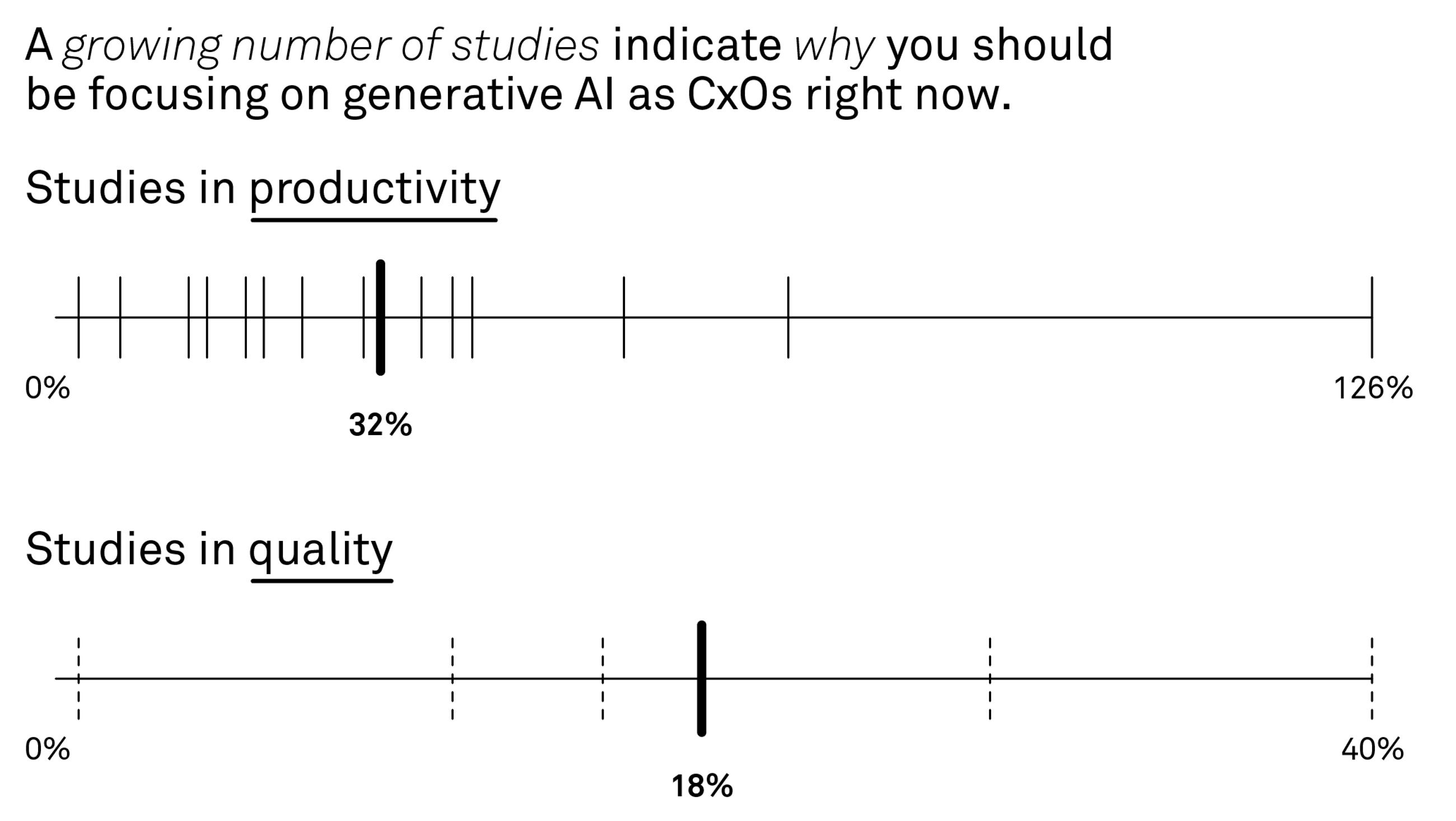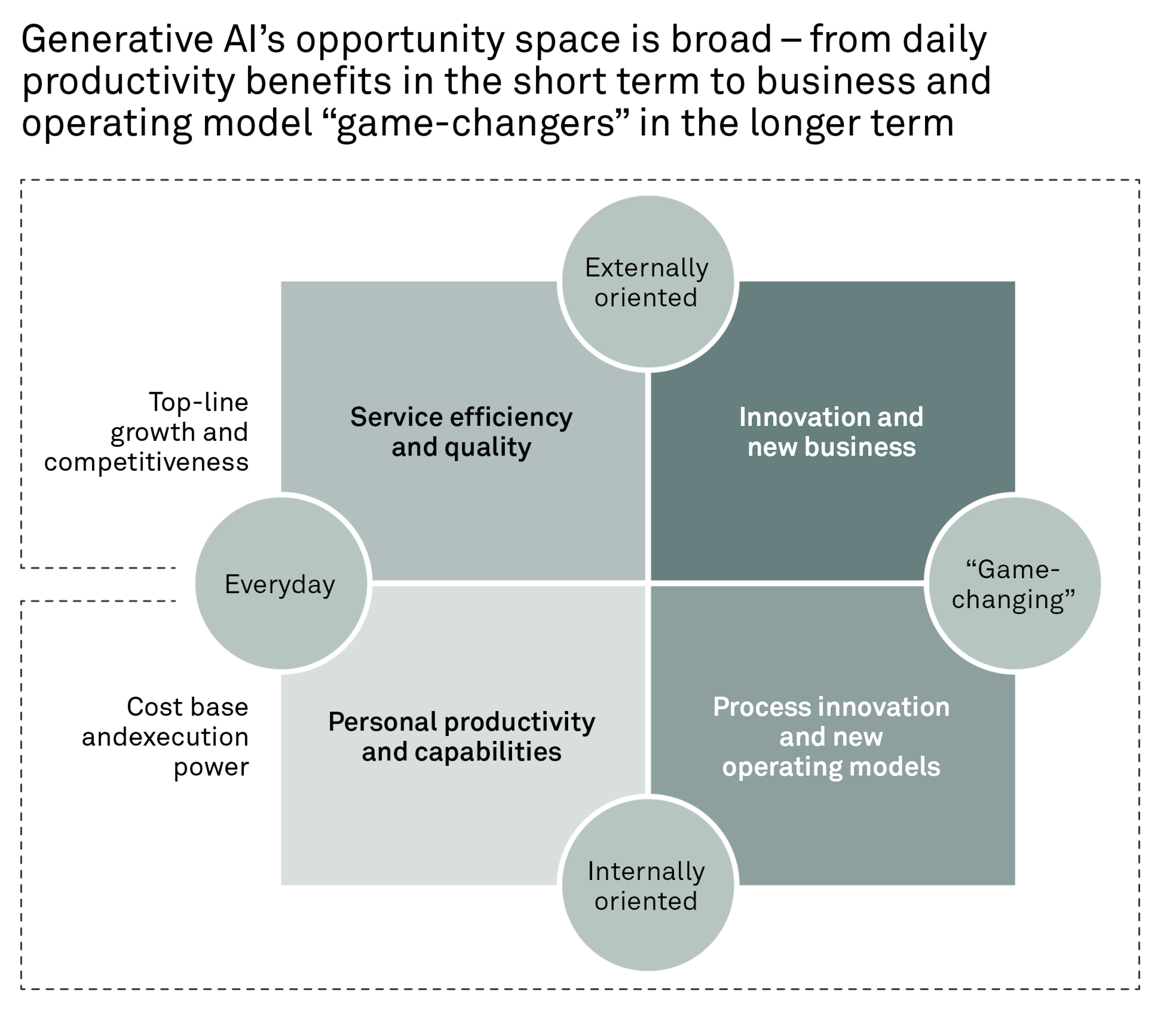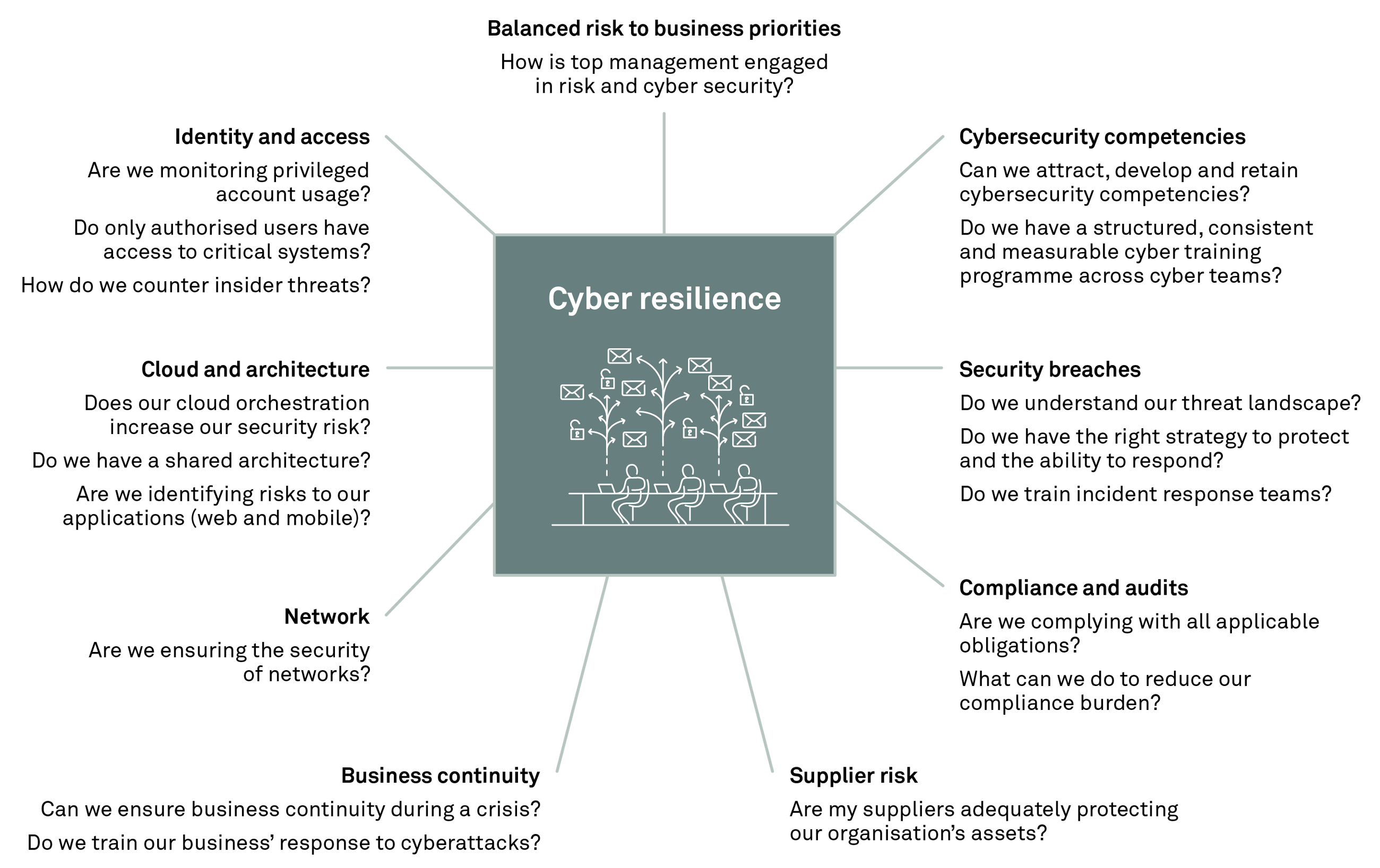– Addressing five worthwhile challenges for Nordic business leaders in 2024.
1 March 2024
2024 is poised to be a year marked by unprecedented change and challenges. In this article, we aim to take a closer look at five of the key focus areas for Nordic executives leading into the new year, where challenges can turn into opportunities and growth and where business value can be captured.
1. Leading Nordic innovation: harnessing generative AI for competitive advantage
In an era marked by unprecedented technological evolution, Nordic companies stand on the brink of a transformative opportunity with generative AI. This digital acceleration is not merely a trend but a fundamental shift, propelling businesses towards new horizons of efficiency and innovation. The emergence of generative AI as a paradigmatic force offers a glimpse into a future where artificial intelligence and human creativity converge, unlocking potential across industries.
The economic implications are profound. McKinsey’s estimation that generative AI could contribute up to USD 4.4 trillion globally1 underscores the magnitude of this revolution. Closer to home, the D9+ region’s anticipated GDP boost of EUR 500 billion over the next decade highlights the unique position Nordic companies occupy at the forefront of this wave. With over 60% of jobs evolving to collaborate with AI2, the narrative shifts from displacement to empowerment, emphasising the symbiotic relationship between technology and talent.
However, harnessing this potential extends beyond technology adoption. It necessitates a strategic mindset shift, fostering environments where innovation thrives through collaboration between humans and their “artificial colleagues”. Nordic leaders, renowned for their forward-thinking and tech-savvy approaches, are uniquely equipped to navigate this transition. By integrating AI into the fabric of their operations, they can unlock new avenues for productivity and quality enhancements, setting new benchmarks for performance.
The journey towards AI integration is characterised by the rapid adoption of large language models and the strategic development of competitive advantages. The challenge lies not in the technological capabilities but in altering perspectives, transforming organisational cultures to embrace rapid change and fostering an environment of continuous learning and adaptation.
As Nordic CxOs navigate this digital frontier, questions of strategic importance emerge:
- How will generative AI redefine our operational and strategic paradigms?
- In what ways can AI-driven innovation enhance customer engagement and operational efficiency?
- What steps must we take to integrate AI seamlessly into our organisational culture, ensuring a collaborative future where technology and human talent amplify each other’s strengths?
The time is now for Nordic leaders to embrace this digital acceleration, leveraging generative AI as a catalyst for innovation, growth and sustainable competitive advantage in the global marketplace. The future beckons with the promise of a new era of business, driven by the harmonious integration of technology and human creativity, where ambitious Nordic companies could lead the charge in defining the contours of the generative AI age.
2. Green growth strategies: how Nordic executives can forge a sustainable future
In the shadow of the 2023 European Green Deal, Nordic business leaders are at a pivotal juncture, tasked with steering their companies towards a future where sustainability is not just a policy mandate but a core element of strategic differentiation and growth. The Green Deal’s ambition for a climate-neutral continent by 2050, coupled with a commitment to reduce emissions by 43% by 20303, underscores an urgent shift towards a low-carbon, climate-resilient economy. In addition, under the Transparency Act, companies are now required to conduct rigorous due diligence to ensure that their operations and supply chains meet strict environmental and human rights standards, thus embedding sustainability deeply into their business models. This commitment is further magnified by the Corporate Sustainability Reporting Directive (CSRD), which elevates sustainability from a compliance exercise to a strategic business pillar, essential for navigating the emerging green economy.
For Nordic companies, sustainability and circularity transcend environmental stewardship; it represents a profound opportunity to innovate, drive efficiency and forge stronger connections with customers and employees alike. Over the last two decades, Nordic companies have outperformed their global peers on value creation, delivering an average annual total shareholder return (TSR) of 11.6%, surpassing the global average of 9.4%, as well as Europe (7.6%), the United States (10.3%) and Asia (9.4%)4. Nordic companies, however, are lagging in creating global giants, with only a few making it onto the list of Europe’s 100 largest since the 1990s5. The challenge lies in scaling businesses and driving growth with a focus on sustainability possibly playing a key role in future resource allocation.
Moreover, sustainable products have seen a growth rate 40% higher than that of their conventional counterparts over the last five years6, reflecting shifting consumer preferences. A significant majority of millennials express a willingness to pay a premium for products deemed environmentally and socially responsible7. The reputation benefits are equally significant. A company’s commitment to sustainability increasingly influences its brand perception, with studies indicating that sustainability and ESG practices account for a substantial portion of consumer and employee sentiment towards a company8. Against the backdrop of these developments, the COP28 UN Climate Change Conference highlights a global consensus on the urgency of climate action, further amplifying the importance of sustainability in corporate strategy.
For Nordic CxOs, the imperative is clear: to redefine their businesses in alignment with a sustainable future, ensuring resilience and relevance in a rapidly evolving marketplace. This necessitates a deep introspection on the part of Nordic leaders:
- Vision and strategy: moving beyond incremental changes to embed sustainability at the heart of business strategy, aspiring not just for a sustainability strategy but for a fundamentally sustainable business model.
- Innovation and commercialisation: leveraging sustainability as a catalyst for innovation, developing products and services that not only meet the current but anticipate future consumer needs.
- Regulatory adaptation: staying ahead of the regulatory curve, ensuring that businesses are not only compliant but also leveraging policy developments to secure a competitive edge.
- Culture and empowerment: fostering a culture where every employee feels empowered to contribute to the company’s sustainability goals, recognising that a collective effort is pivotal to meaningful progress.
In this era of profound environmental, social and regulatory change, Nordic businesses have an unparalleled opportunity to lead. By integrating sustainability into the core of their strategies, they can drive long-term value creation, not just for their shareholders but for society at large, securing a competitive advantage in the green economy that will define the future of global business.
3. Adapting to global economic shifts: a strategic guide for Nordic business leaders
The global economic landscape is in constant flux, shaped by geopolitical tensions, evolving trade policies and dynamic market forces. For Nordic CxOs, the ability to navigate these changes is not just a matter of corporate survival but a strategic opportunity to advance their companies’ positions on the global stage. The past two years have presented a complex mix of conditions, including unprecedented inflation rates reaching double digits for the first time in three decades and a tenuous demand-supply equilibrium. As we look towards 2024, several themes emerge, shaping the economic outlook for the Nordic region and beyond.
Inflation, although gradually receding, remains significantly above the levels deemed healthy by central banks, approximately twice their 2% target. This persistent inflationary pressure, coupled with expectations that interest rates will remain elevated throughout 2024, continues to challenge consumer confidence and slow economic recovery. Economists anticipate a gradual upturn in economic activity, predominantly in the latter half of the year, against a backdrop of energy prices persisting at two to four times above pre-crisis levels. This has not only affected the competitiveness of energy-intensive Nordic businesses but has also expedited the EU’s green transition by an estimated five years.
Furthermore, the geopolitical landscape continues to evolve with increased trade restrictions and a notable stagnation in globalisation trends, prompting a shift in supply chain strategies away from China towards more cost-effective reshoring or friend-shoring alternatives.
For Nordic leaders, these conditions underscore the critical importance of incorporating a macroeconomic perspective into strategic planning. Understanding the broader economic forces at play allows businesses to proactively adapt their strategies, rather than reactively responding to shifts. This foresight is essential for seizing opportunities, fostering innovation and ensuring the long-term sustainability and success of the business.
However, translating these global economic shifts into actionable strategies requires a deep dive into the specific macroeconomic factors that could impact the value levers within their industry and their own businesses. Reflecting on the significant macro shifts shaping the industry, the alignment of current business strategies with these shifts and the company’s relative position within the industry can provide valuable insights. Identifying which commercial and operational levers to pull and how to allocate capital effectively becomes a strategic imperative.
As we move forward, Nordic CxOs must consider:
- The most significant macro shifts currently shaping their industry and their potential impact on business in both the short and long term.
- How well aligned our current business strategy is with these macro shifts and where we need to adapt or innovate to remain relevant and competitive.
- Our relative position within the industry and whether we are positioned to play offense, invest to grow or need to undergo rapid cost-out transformation.
- The value levers we can pull across commercial, operational and financial domains and how we reallocate resources to adapt effectively.
Navigating the global economic shifts of 2024 demands not just strategic agility but a commitment to continuous adaptation and innovation. For Nordic companies, this period of change is not just a challenge to overcome but an opportunity to redefine their growth trajectories and solidify their positions in the global market.
4. Building resilience in the workforce: strategies for talent development and retention
In the rapidly evolving landscape of 2024, the capacity of Nordic companies to develop a resilient and adaptive workforce stands as a critical determinant of their competitiveness and growth. The swift pace of digital transformation, compounded by the lingering effects of the global pandemic, underscores an urgent need for focused talent development, reskilling initiatives and strategies to accommodate a more fluid and capable workforce.
Reflecting on insights from 2018, McKinsey highlighted a striking projection: approximately 375 million workers globally (or 14%) might need to transition across occupational categories by 20309 due to the disruptive forces of automation and artificial intelligence reshaping our work paradigms. This shift is further accentuated by the changing nature of work locations, with the average number of days spent in the office reducing to about 3.5 days per week, marking a 10% decrease10.
This evolving scenario presents both a formidable challenge and a substantial opportunity for Nordic leaders. The challenge lies in bridging the skills gap, ensuring that employees possess the requisite competencies for the jobs of tomorrow. Conversely, the opportunity emerges from harnessing these workforce transformations as a lever for innovation and strategic advantage. According to forecasts by Dell and the Institute For The Future (IFTF), an estimated 85% of the skills required in 2030 are not yet defined11, emphasising the critical need for ongoing learning and development efforts.
The essence of reskilling and upskilling transcends mere gap filling; it is about instilling a culture of agility, continuous learning and adaptability within organisations. When executed effectively, these capability development programmes can significantly enhance employee engagement and retention rates and foster a more innovative, forward-looking organisational ethos. Deloitte’s 2023 study corroborates this, showing that organisations with a strong learning culture are 92% more likely to innovate and achieve up to 52% higher productivity12.
The imperative for Nordic companies is clear: how can they adeptly implement these programmes? Success hinges on aligning learning initiatives with the workforce’s specific needs and the strategic objectives of the business. This alignment involves crafting personalised learning pathways that reflect individual career goals and employing technology to make learning accessible and pertinent – such as utilising generative AI for customising onboarding processes, training and coaching.
Beyond technical proficiencies, cultivating a resilient workforce also demands an emphasis on soft skills development, including emotional intelligence, critical thinking and adaptability. These skills are pivotal for employees to effectively manage change, collaborate and drive continuous improvement. Moreover, accommodating the increased desire for full-time remote work opportunities, especially among millennials, is crucial for building workforce resilience.
As we navigate forward, the role of leadership in championing these initiatives becomes increasingly vital. Leaders must exemplify resilience and adaptability, inspiring their teams to view change not as a hurdle but as a conduit for growth and innovation.
Ultimately, fostering a resilient and adaptive workforce is a strategic necessity for Nordic companies aiming to thrive in a business landscape characterised by intense competition for talent. Organisations that prioritise talent development and nurture a culture of continuous learning will be uniquely positioned to overcome the challenges and capitalise on the opportunities that the future holds.
Data as a growth lever: mastering security and privacy in the digital age
As we advance deeper into 2024, Nordic companies are increasingly recognising that robust data security and privacy practices are not just regulatory obligations but pivotal growth enablers. The digital era has ushered in stringent regulations, such as the General Data Protection Regulation (GDPR) and the upcoming Artificial Intelligence Act (AI Act), alongside the NIS 2 Directive aimed at enhancing cybersecurity across critical sectors. These regulatory frameworks, while often viewed through the lens of compliance, counter-intuitive opportunity for businesses to distinguish themselves, fostering trust with customers and partners in a landscape fraught with cyber threats.
The importance of data security and privacy is magnified by consumer awareness and expectations. A Harvard Business Review study from 2020 highlighted that 90% of consumers perceive the treatment of their data as indicative of how they are valued by companies13. This direct correlation between data practices and customer loyalty underscores the potential for data privacy to drive revenue growth.
Embracing strong data security and privacy measures can yield significant advantages for Nordic businesses. Firstly, it can substantially enhance brand reputation. Companies recognised for safeguarding customer data effectively attract and retain customers more successfully. McKinsey’s 2022 research supports this, indicating that organisations at the forefront of digital trust are more likely to experience annual growth rates of at least 10% on their top and bottom lines14. Secondly, robust privacy practices can facilitate expansion into new markets, especially those with stringent data protection laws outside the EU, such as Australia, Brazil and Japan, thereby fostering growth and international expansion.
However, achieving a high level of data security and privacy comes with its set of challenges, particularly as technology evolves and threats become more sophisticated. The global cybersecurity market revenue is expected to grow at a CAGR of 12.3% towards 2030, reaching an unprecedented USD 183 billion in 202415, emphasising the critical need for a comprehensive approach to data protection. This involves integrating advanced technologies like encryption, blockchain and AI-driven security mechanisms to safeguard data assets effectively. But more importantly, building cyber resilience goes beyond mere technological adoption, embedding at its core the development of robust risk management frameworks, the cultivation of cyber resilience among employees and the strategic planning for business continuity and disaster recovery. It also extends to ensuring supply chain security and formulating effective incident response strategies. These measures are critical to mitigating the impact of cyber threats and ensuring a swift return to normalcy in the wake of disruptions, thereby safeguarding the company’s operational integrity and maintaining stakeholder trust.
For Nordic CxOs, the path forward entails a strategic integration of data security and privacy into their business models to enhance competitive advantage and build customer trust. Key considerations include adopting technologies and processes that align with both current regulations and consumer expectations, fostering a culture of privacy and security awareness to mitigate risks and leveraging data security practices as a differentiator in new markets.
Reflecting on the following questions can guide Nordic leaders in navigating these complexities:
- How can we embed data security and privacy into our business model to strengthen competitive advantage and foster customer trust?
- What innovative technologies and processes can we implement to ensure robust data protection that meets evolving regulatory requirements and consumer expectations?
- How do we cultivate a culture of privacy and security awareness within our organisation to prevent breaches and manage risks effectively?
- In what ways can our commitment to data security and privacy open doors to new markets and attract customers who prioritise data protection?
In the rapidly evolving digital landscape of 2024, the strategic integration of data security and privacy practices offers Nordic companies a clear path to unlocking growth opportunities while safeguarding their operations against the increasingly sophisticated cyber threats of the digital age.
Navigating 2024: a call to action
For the year ahead and beyond, Nordic business leaders face pivotal challenges: embracing generative AI, driving sustainable growth, adapting strategically in a shifting economy, fostering workforce resilience and ensuring data security. This moment demands decisive action and visionary leadership. By leveraging these challenges as opportunities, leaders can set new standards of innovation and sustainability, distinguishing themselves globally. The time to act is now – to redefine, innovate and lead the Nordic business landscape towards a successful, resilient future. The most ambitious Nordic companies will be the ones seizing this moment with courage and conviction.
References
1 The economic potential of generative AI: The next productivity frontier, Michael Chui, Eric Hazan, Roger Roberts, Alex Singla, Kate Smaje, Alex Sukharevsky, Lareina Yee and Rodney Zemmel, McKinsey Digital, June 2023
2 The economic opportunity of generative AI in D9+, Implement Consulting Group, December 2023
3 The European Green Deal - Striving to be the first climate-neutral continent, European Commission
4 Nordic champions: The value creation formula at the cusp of a new era, Kim Baroudy, Jens Riis Andersen and Gustav Vilsbøll Lauritsen, McKinsey & Company, December 2023
5 Bold moves to forge Nordic champions, Fredrik Dahlqvist, Tobias Lundberg, Jens Riis Andersen and Magnus Tyreman, McKinsey & Company, June 2021
6 Consumers care about sustainability—and back it up with their wallets, Sherry Frey of NielsenIQ and Jordan Bar Am, Vinit Doshi, Anandi Malik and Steve Noble, McKinsey & Company, February 2023
7 Reaching eco-conscious consumers in the US – behavior, habits, and trends, Kineree Shah, YouGov, March 2023
8 The Importance of CSR and Why a Company Should Embrace it, Winnie Ellis-Hall, DRP Group
9 Jobs lost, jobs gained: What the future of work will mean for jobs, skills, and wages, James Manyika, Susan Lund, Michael Chui, Jacques Bughin, Lola Woetzel, Parul Batra, Ryan Ko and Saurabh Sanghvi, McKinsey & Company, November 2017
10 How hybrid work has changed the way people work, live, and shop, McKinsey Global Institute, July 2023
11 What Do Robots, VR and AI Have To Do With Government?, July 2018, Dell Technologies
12 Leading in Learning - Building capabilities to deliver on your business strategy, Deloitte
13 Do You Care About Privacy as Much as Your Customers Do?, Thomas C. Redman and Robert M. Waitman, Harvard Business Review, January 2020
14 Leading Off: Is your organisation digitally trustworthy? A leader’s guide, Rama Ramaswami, McKinsey & Company, October 2022
15 Cybersecurity – Worldwide, Statista












